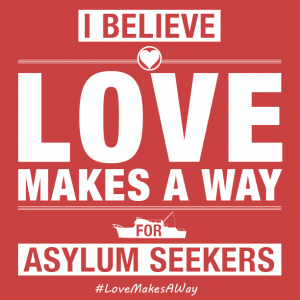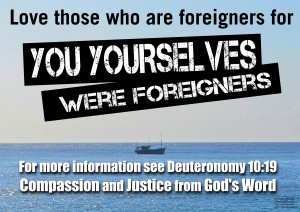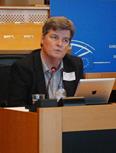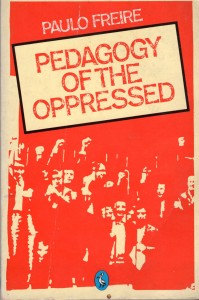Love Making A Way
 Is the Love Makes A Way campaign a new phenomenon? Maybe, maybe not. It certainly is within this generation of Australians.
Is the Love Makes A Way campaign a new phenomenon? Maybe, maybe not. It certainly is within this generation of Australians.
For those who are unaware, it is a movement grounded in the Christian churches, that protests our government’s (and therefore our nation’s) utterly appalling treatment of asylum seekers and refugees. There is much that can be said, and is being said, about this, the real issue: Australia is mistreating men, women, and children – real men, real women, real children, real people. The justification is a veil of spin. The execution of the policy is empty, not only of humanity, but of foundational political principles about accountability, transparency, and the power of executive government. My commentary here would only add to the noise, particularly since the devastatingly draconian amendments to the Migration Act were recently passed. A good place to start, however, would be this article by two political heavyweights from both sides of the fence (a former conservative PM, and a former Labor Minister) who rightly note:
We should rightly ask, if the government is prepared to be so cruel and give itself this much unchecked power over refugees, who’s next?
It is genuinely scary stuff.
But to return to Love Makes A Way: The form of protest adopted by this group is one of non-violent civil disobedience. Pastors, priests, nuns, and other Christians, enter the electorate office of a politician; they sit down and pray and politely refuse to leave while their concerns about refugees remain unaddressed. In the vast majority of cases they are eventually gently lead away by police, charged, appear in court, and are given a rap over the knuckles or even vindicated. Awareness is raised, the alternative voice is heard.
Personally, there is much that I admire about this:
- Civil disobedience in the “pure” sort is when you find yourself in the path of a wrongdoing and you refuse to cooperate. This is the next step: In physical, practical terms, by entering the electorate offices the protestors are placing themselves in the path, and then refusing to cooperate. To the extent that silence in the presence of oppression is a form of cooperation, it is my view that this next step is justifiable.
- It aspires to protest in the right spirit. There is nothing about this that is angry young chanters who are violent in their words if not with their actions. This is about polite, gentle, peaceful, but firm refusal to cooperate with wrong, and I find that admirable.
- It is (and I hope it remains) distinctively Christian. Not in the sense that only Christians can protest this way, but by the self-identity of the protestors: it is Christian spirituality that is their common ground (across quite a diversity of other distinctives), and it is their Christian spirituality which motivates them. This not only gives coherency, but also identifies the movement with a much wider swathe of the community than your typical banner-waver. [NB: There have been rabbis involved in some of the protests, so perhaps “Judaeo-Christian” would be the more precise descriptor]
As to its effectiveness, that remains to be seen. In terms of public perception, it is surely more notable when a nun gets arrested for sitting in an office than if an angry young student gets arrested in a caterwauling face-off with police.
In political terms, not much has changed. It certainly hasn’t checked the resolve of Abbott, Morrison and co. (many of whom claim a Christian faith) in their policies, nor even in their attitude and manner of executing that policy. I’ve always said that it’s one thing to have to be “tough” in a world of terrible choices, it makes a whole new other thing when such toughness is crowed about with triumph, not exercised as a perceived necessity with tears and trembling.
In electoral terms, it’s complicated. On the one hand, from a conservative point of view, these are not protestors that can simply be wiped away into the corner of “loony lefties that would never vote for us anyway.” No, those who sympathise with and support Love Makes A Way includes the full-range of swing voters (like myself), and is encroaching into conservative home territory. And many of those who are protesting are thought-leaders. If I were a Government MP I’d be counting my numbers. But… and this is the big but… I wouldn’t be too worried because the Opposition’s track record on this issue is almost as bad. It’s a matter of “who else you going to vote for?” Unless there’s a viable alternative, the electoral effect of Love Makes A Way is severely dampened.
But there’s nothing quite as persistent as those who know they’re on a “mission from God” (just ask the Blues Brothers). Except of course, those who are on a mission and also have blood in the game. And this is what we now have with Love Makes A Way. It takes a certain level of courage to face arrest. But once that hurdle is passed, the resolve is strengthened. I mean, “What’s the worst that could happen? We get arrested?…. Again?” Movements that pass that point are persistent, and people notice, and it scares them.
In these last few days, Love Makes A Way, has passed this particular threshold. On December 10, Human Rights Day, another round of “pray-ins” occurred throughout the nation. It could have been just another round of polite conversations, awkward-looking but very-professional police, a file past the TV cameras, and an obscure court appearance a few weeks later.
But in Perth, for some reason, someone thought an increase in intimidation would be sensible. A media release describes it:
Australian Federal Police and WA Police attended the scene. WA Police repeatedly threatened the church leaders with strip-searches and attempted to provide the group with inaccurate information about other sit-ins around the country. More than 7 hours elapsed between the arrival of police and arrests being made. At the Perth Watch House each of the church leaders was refused the opportunity to seek legal advice, stripped naked and searched. The church leaders repeatedly expressed that they did not consent to the search, and repeatedly advised police that they were not in possession of firearms or drugs.
From the Government’s point of view, the escalated response is stupid. It just brings more attention, it engenders more sympathy, it’s a lose-lose in every conceivable outcome. My first thought was, “What were the authorities thinking?” And my second thought was: Dear Love Makes A Way, keep in the opposite spirit; to indignity and violence, render gentleness and respect. Keep “on attitude” as well as “on message.”
If they can do that, they’ve won. They may not see it for a while, but they’ve won already.
The response from Love Makes A Way, so far, is pretty good:
Us pastors & a female priest being strip searched “for weapons & drugs” is not the story. The dehumanisation of refugees is. #LoveMakesAWay
— Jarrod McKenna ن (@jarrodmckenna) December 10, 2014
Perth #LoveMakesAWay arrestees being released slowly. All strip searched. Nothing compared to indignities suffered by those in detention.
— Father Chris (@FrChrisBedding) December 10, 2014
‘I was outraged to be stripped naked’ ‘but more outraged at the way gov is treating helpless babies’ http://t.co/ouLZB9GLYH #LovesMakesAWay
— Sydney Hirt (@Sydhirt) December 10, 2014
We can confirm Perth #LoveMakesAWay group were indeed strip searched by police. But the real story is the ongoing dehumanisation of refugees
— Love Makes A Way (@lovemakesaway) December 10, 2014
They are right, the real story is the asylum seekers. But it is not the only story. The story of a growing number of ordinary Christians, willing to do the hard yards of finding the right spirit, and refusing to cooperate with evil, is also real. And it’s a story that hasn’t readily been heard in Australia, certainly not in this generation.
Postscript: As I write, a group of seven Love Makes A Way protestors are facing court in Geelong for their protest in October. They are pleading guilty but asserting their belief that they have done the “right thing.” They are giving no guarantees of good behaviour, because in all honesty, they will not commit to repeat their actions. They have been fined $200 without conviction recorded. This of course would be very interesting if it ever gets this far in Tasmania, considering the recent passage of new anti-protest laws in this State.









